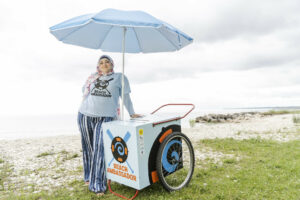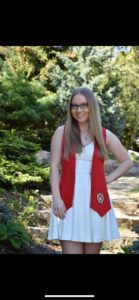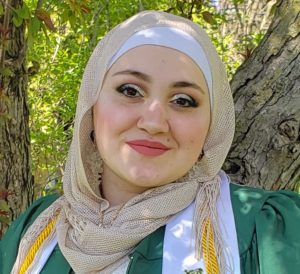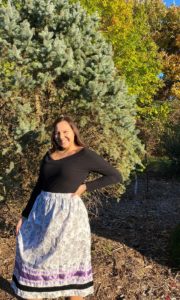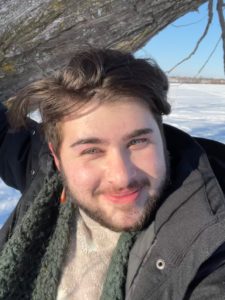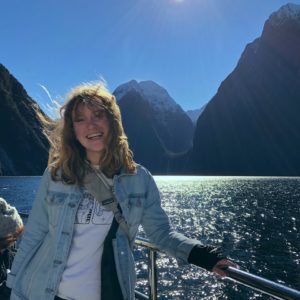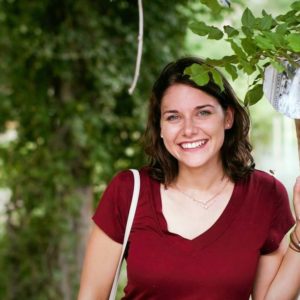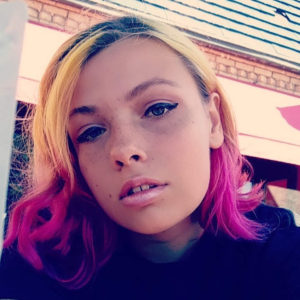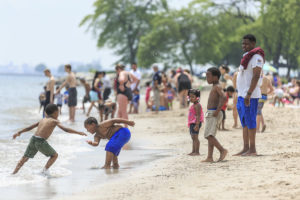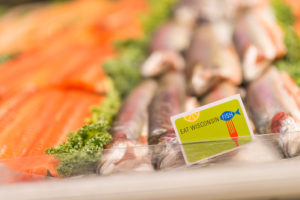Summer scholars benefit from mentoring during internship
The 2022-23 school year is just around the corner. For a group of 10 undergraduate students, a big corner in their academic careers has already been rounded—a 10-week Sea Grant summer internship probing freshwater science topics, which recently concluded.
The undergraduates were selected through a competitive process that drew interest from students across the U.S. and territories. Sea Grant staff, and collaborators from the U.S. Environmental Protection Agency’s (EPA) Great Lakes Toxicology and Ecology Division Laboratory; Lake Michigan Stakeholders; and Great Lakes Indian Fish and Wildlife Commission provided mentorship and helped advance work on projects that:
- Shared dangerous current information with Great Lakes beachgoers.
- Communicated about Wisconsin farm-raised and wild-caught fish.
- Expanded the voices heard in the Wisconsin Water Library.
- Advanced the goals of the Lake Michigan Stakeholders nongovernmental agency.
- Conducted a literature search on the linkages between mental health and climate change to prepare for future work.
- Explored a mutual shared history and sense of place in Great Lakes communities
- Coordinated on GIS projects to understand ecosystems.
- Considered manoomin harvest in the context of climate adaption and resilience.
- Assessed the risk of spreading aquatic invasive species in the used-watercraft marketplace.
Meet the interns who made a difference this summer. They answered some questions about the experience, and then threw in a comment about their preferred superpower:
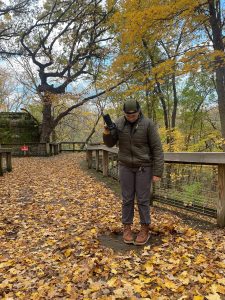
Korynne Wilson. Submitted photo.
Korynne Wilson will be a junior at Beloit College this fall, majoring in biology and double minoring in public health and education. She spent the summer acting as an ambassador for water safety and water quality on Milwaukee’s Great Lakes beaches, having conversations with beachgoers. Wilson said it was rewarding to provide people with water safety resources that they may not have had before, especially families with young children. When not on the beach, Wilson undertook equity-related projects within Milwaukee, including addressing transportation barriers to lakefront recreation areas. Going into the medical field, Wilson said the internship opened her eyes to just how much lack of access and resources to water is a public health and safety issue, predominantly affecting minority populations. If Wilson had a superpower, she would be most satisfied with teleportation.
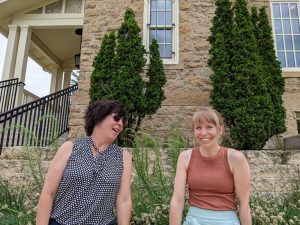
Emma Kraco (right) with mentor Eat Wisconsin Fish Specialist Sharon Moen, who is with Sea Grant. Photo: Jennifer Smith
Spring 2022 graduate of the University of Wisconsin-Milwaukee, Emma Kraco put her biology degree and extensive experience working with aquaculture systems to use as part of the Eat Wisconsin Fish initiative. The initiative connects consumers, fish farmers and commercial fishers through information about local fish available for purchase in Wisconsin. It seeks to create a safe and sustainable seafood supply to meet consumer demand, as well as foster informed consumers who understand the health benefits of seafood consumption and how to evaluate the safety and sustainability of the seafood they buy. Kraco led data management efforts that fuel directories and the map on the Eat Wisconsin Fish website. She said, “The most rewarding thing was connecting with local producers and hearing their needs. I loved being able to connect people to resources to make their work easier.” The internship also sparked future goals, with Kraco saying, “This opportunity has inspired me to continue to hone my skills in science communication. I believe that having the chance to connect with producers in this way has made me a better scientist. This internship also tipped the scales on my decision to pursue a master’s in geographic information services.” Finally, if possessing a superpower was a reality, Kraco said she would be breathing underwater “without all the pesky gear.”
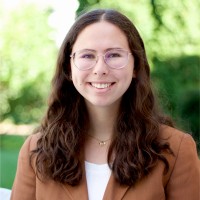
Maya Reinfeldt. Submitted photo.
Over the course of 10 weeks, Maya Reinfeldt explored the collections and programming of the Wisconsin Water Library with a critical eye towards ensuring multicultural perspectives and approaches. One project was the expansion of the Maadagindan! Start Reading! Book Club, which serves librarians and educators and is focused on children’s books about Ojibwe culture and the Great Lakes. (go.wisc.edu/e964d6). The book club resumes in the fall and Reinfeldt put plans in place for those upcoming talks. She is a 2002 International Relations and Russian Literature degree-holder from the University of Wisconsin-Madison. Reinfeldt said the internship, “Solidified my conviction that cultural and linguistic diversity and exchange be a facet of any career I may develop. In my professional and academic career thus far, nothing else has felt more purposeful, hopeful and fulfilling (than the internship).” She said her superpower of choice is, “Not getting tired while biking to work!”
The Lake Michigan Stakeholders organization is made up of professionals in the fields of environmental management, academic research, education, community outreach, outdoor advocacy, agriculture and private industry. Its members collaborate to promote and celebrate the health and viability of Wisconsin’s Lake Michigan basin through stewardship and education. Sea Grant forged a partnership with the group and supported two interns this summer—Hali Jama and Isabella Blanco—who in turn supported the goals of Lake Michigan stewardship and education.
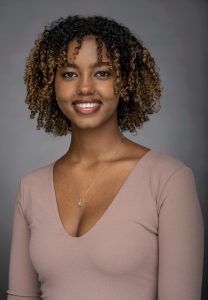
Hali Jama. Submitted photo.
Jama will be a junior this fall at the University of Wisconsin-Madison, where she is majoring in business, an academic path she recently broadened. “Honestly, a year ago today, my plan was to pursue business and business only, but since working with Wisconsin Sea Grant, I have added environmental studies as a minor,” she said. “I am excited to continue to learn and immerse myself in work that makes a difference.” Through a concurrent internship, Jama also produced Sea Grant podcasts on environmental justice. Her No. 1 pick for a superpower is teleportation. “I am a very time-strict person, and if I could just snap my fingers and be where I am supposed to be then my life would be much easier.”
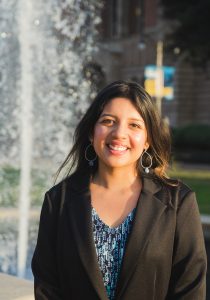
Isabella Blanco. Submitted photo.
The second Lake Michigan Stakeholders intern, Blanco, said, “My experience with Wisconsin Sea Grant has been an informative and engaging look into water education and management in Wisconsin. By collaborating with the Lake Michigan Stakeholders, I have worked on their communication strategies and developed environmental equity toolkits.” The rising senior who is majoring in environmental science at the University of California Los Angeles went on to note, “The most rewarding aspect of this experience has been being able to plan Lake Michigan Day and reach out to organizations in Wisconsin about collaborating with Lake Michigan Stakeholders.” Like her fellow Lake Michigan Stakeholder intern, Blanco selected teleportation as a dream superpower. “I would be saving gas emissions and traveling the world!”
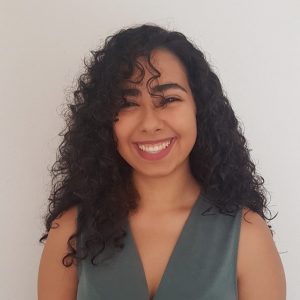
Genesis Perez. Submitted photo.
Genesis Perez is a recent graduate of the Inter American University of Puerto Rico, Arecibo Campus with a degree in biotechnology and minors in biology and chemistry. She said, “The most rewarding part of my internship was definitely being able to work more independently and create my own research project from scratch. It was such an interesting process from going to just a broad idea to getting to the point of having specific research questions.” That research project centered on the intersection of mental health and climate change. The goal of the project was to build understanding of how climate change is impacting mental health in Wisconsin, especially in the state’s northern coastal communities, and ways that community outreach can be responsive to mental health. And a superpower? “If I had a superpower, it would be teleportation. This would be handy because commuting is tiresome at times, and I would love to just appear where I need to be! Plus, the benefit of just appearing in a new city for a weekend would be exciting,” said Perez.
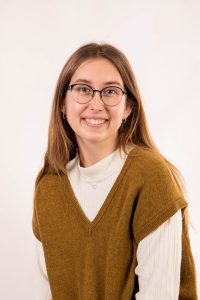
Jaycie Hudson. Submitted photo.
For Jaycie Hudson, August is winding down, but planning for the future continues to ramp up. She said the internship, “Gave me has some really strong experience in researching a specific topic and doing something meaningful with the information. This internship has helped me prepare for applying to graduate school, because I now feel more comfortable coming up with research topics and reaching out for help to actualize them.” She credited the support from Katie Williams and Tom Hollenhorst, with the EPA in Duluth, Minnesota. “They have been flexible and willing to teach me things outside of just the internship. I have learned a lot more than I expected, and I can see how I will be able to use the skills from the internship in the future,” said Hudson, a rising senior at the University of Minnesota Duluth. She is majoring in biology and community health, and through the internship Hudson developed existing and new tools and platforms for crowdsourced local knowledge and sense of place in the Great Lakes Basin. The work explored how crowdsourcing with public participation geographic information systems and social media analysis can reveal local knowledge and history as well as local community values, placed-based memories and experiences. Zooming in on those local memories would be easier using Hudson’s superpower of choice—microscopic vision.
The final three interns were Mansi Patel, a 2022-23 junior at the University of California Santa Barbara who researched activities associated with a variety of Great Lakes ecosystems; Justin Azure, a chemical engineering major at the University of Minnesota Duluth who researched the history of manoomin and its importance to Indigenous people, and helped plan events and workshops; and Isabella Noyle, who will be a 2022-23 senior at Concordia College, and who collected data on the risk of moving aquatic invasive species from place to place via the sale of used recreational watercraft.
The post Summer scholars benefit from mentoring during internship first appeared on Wisconsin Sea Grant.News Releases | Wisconsin Sea Grant
News Releases | Wisconsin Sea Grant
https://www.seagrant.wisc.edu/news/summer-scholars-benefit-from-mentoring-during-internship/?utm_source=rss&utm_medium=rss&utm_campaign=summer-scholars-benefit-from-mentoring-during-internship

